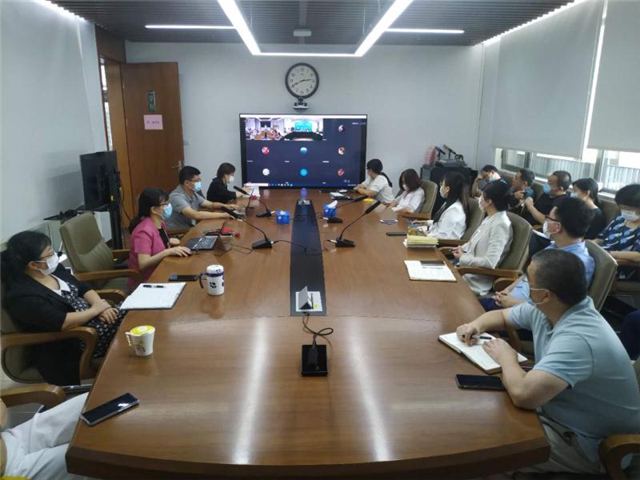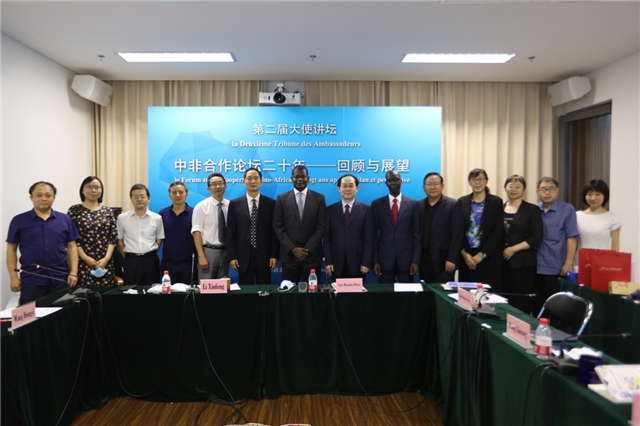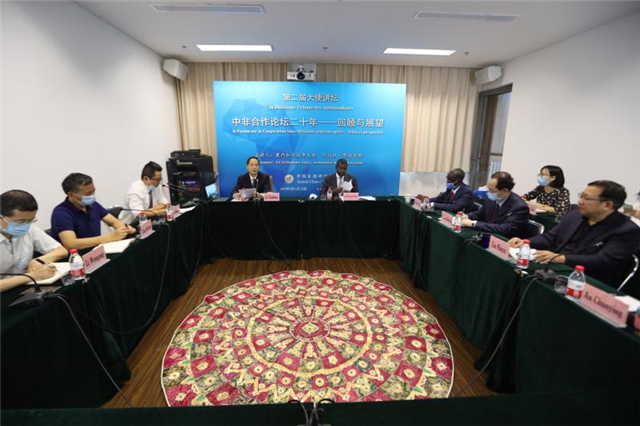
The second "Ambassador Lecture" was held offline and online on August 27. Senegal's Ambassador to China Mamadou Ndiaye was invited to deliver a keynote speech at the main lecture. The main venue of the lecture is located in Beijing. The Lecture was organized by the China-African Institute(CAI), and the theme was 20 years of the Forum On China-Africa Cooperation(FOCAC): retrospect and outlook. Researcher Li Xinfeng, the Executive President of the CAI and director of the Institute of West-Asia and Africa Studies (IWAAS), Chinese Academy of Social Sciences (CASS), chaired the lecture. Researcher Wang Lincong, deputy director of the IWAAS,CASS, attended the lecture. More than 80 experts and scholars from research institutions such as the CAI, China Institute of International Studies, and Shanghai Institute of International Studies participated in the lecture online and offline.
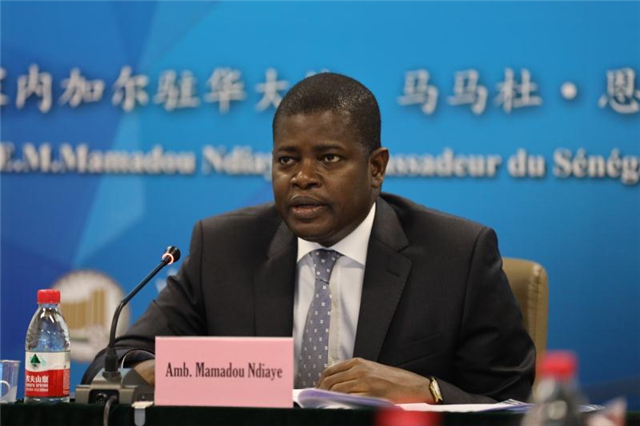
Ambassador Ndiaye said in his keynote speech that 2020 is the 20th anniversary of the establishment of the FOCAC. The FOCAC has become one of the most dynamic and fruitful partnerships established between Africa and other countries and regions in the world. Since the establishment of the FOCAC in October 2000, China-Africa diplomatic activities have been frequent and cooperation has yielded fruitful achievements. So far, the FOCAC has successfully hosted three summits, seven ministerial conferences, more than ten senior officials’ meetings, as well as the meeting of coordinators for the achievements implementation of the summit, the political consultation meeting between Chinese and African foreign ministers, regular consultation meetings between The Chinese Follow-up Committee and African diplomatic envoys in China, etc. The dialogue mechanism under the framework of the FOCAC has maintained a close rhythm.
Ambassador Ndiaye believes that there are four main reasons why the FOCAC has strong vitality and achieved great achievements. First, the establishment of the FOCAC has deepened China-Africa cooperation and promoted the diversity of China-Africa cooperation. Second, the FOCAC has formulated a three-year action plan to allocate resources for the implementation of the plan, ensuring the implementation of specific plans and ensuring the predictability of China-Africa cooperation. Third, the 2015 and 2018 FOCAC Summits respectively announced the "Ten Major Cooperation Plans" and "Eight Major Actions". These measures are not only conducive to the steady implementation of priorities, but also take into account the integrity of China-Africa cooperation. Fourth, by implementing high-quality action plans, the FOCAC has ensured that the outcomes of China-Africa cooperation serve the interests of both China and Africa, and proved that China-Africa relations are indeed a win-win partnership.
Ambassador Ndiaye emphasized that in the past 20 years, China-Africa relations have made a series of achievements in politics, economy and trade, health, security, humanities and other fields, and entered the best period of rapid, stable and comprehensive development. And stride forward towards building a closer China-Africa community with a shared future. The Chinese and African people have reason to be confident and optimistic about the future of China-Africa cooperation. However, facing the impact of the COVID-19 pandemic and the ever-changing international situation, China-Africa cooperation should focus on the priorities of promoting economic growth, improving people’s livelihood, ensuring food security, and maintaining public health security, and actively implement the "FOCAC" --Beijing Action Plan (2019-2021)". Strengthen the synergy between Chinese and African think tanks, and give full play to the important role of China-Africa think tanks in promoting China-Africa cooperation in the post-epidemic era.
In the interactive session, Wang Lincong, vice president of the China-African Institute, Liu Jisen, executive dean of the African Institute of Guangdong University of Foreign Studies, Liu Naiya, director of the Social and Cultural Research Office of the China-African Institute, Zeng Aiping, associate researcher of the China Institute of International Studies, and Shanghai International Studies associate researcher Zhou Yuyuan of the Academy had full exchanges with Ambassador Ndiaye about the importance of China-Africa relations, the opportunities and challenges facing China-Africa relations, the agenda setting of the 8th China-Africa Cooperation Forum, and the friendly and cooperative relations between China and Senegal, etc.
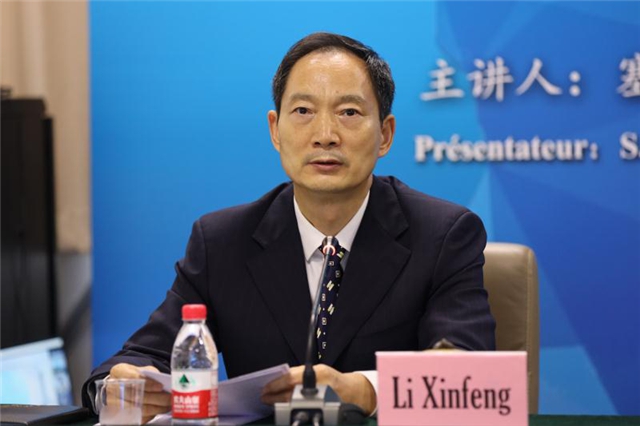
Before the end of the lecture, Li Xinfeng concluded that the FOCAC is an important measure to meet the common needs of China and Africa and fill the gaps in the China-Africa multilateral dialogue mechanism. Ambassador Ndiaye’s affectionate review not only outlines the 20-year development of the China-Africa Cooperation Forum, but also provides sincere suggestions for further strengthening China-Africa cooperation in the future, further deepening China-Africa relations and promoting China-Africa think tank cooperation put forward new requirements.
In order to implement the spirit of the congratulatory letter from President Xi Jinping to the establishment of the CAI and give full play to its role as a platform for China-Africa people to people exchanges, the China Africa Institute established the "Ambassador Lecture" in 2020 and carried out a series of related activities. It inviting Chinese diplomatic envoys to Africa and African diplomatic envoys to China to give keynote lectures, the exchange of experience and academic discussions between front-line diplomatic envoys and Chinese and African academic circles were promoted. In January 2020, the CAI held the first "Ambassador Lecture". Zhai Jun, the Special Envoy of the Chinese Government on the Middle East, was invited to give a keynote speech, which received extensive attention from China and Africa.
